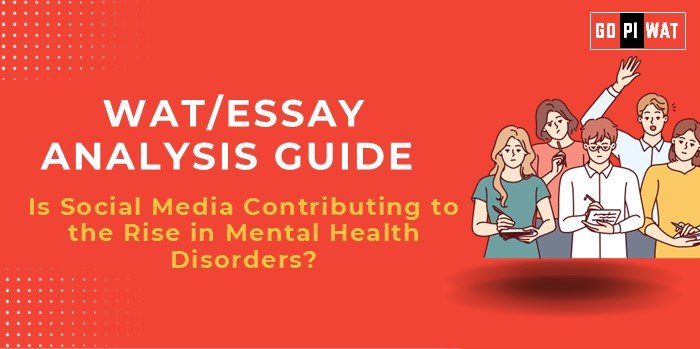📋 WAT/Essay Analysis Guide: Is Social Media Contributing to the Rise in Mental Health Disorders?
🌐 Understanding the Topic’s Importance
Social media’s pervasive role in modern life makes it a pivotal topic for B-school essays, intersecting with themes of ethics, technology, and mental well-being.
📝 Effective Planning and Writing
- ⏱️ Time Allocation:
- Planning: 5 minutes
- Writing: 20 minutes
- Review: 5 minutes
- 📚 Preparation Tips:
- Gather data on user behavior, stakeholders, and existing interventions.
💡 Introduction Techniques for Essays
- ⚖️ Contrast Approach: “While social media connects billions, it increasingly correlates with mental health crises, revealing an urgent need for balanced usage.”
- ✅ Solution-Based Approach: “As social media becomes indispensable, promoting digital hygiene is crucial to mitigating its mental health effects.”
📖 Structuring the Essay Body
Achievements:
- ✨ Campaigns like #EndCyberBullying foster awareness.
- 🤝 Teletherapy and community support groups offer help.
Challenges with Comparative Analysis:
- ⚠️ Cyberbullying and addiction, with higher rates in tech-reliant societies.
- 📖 Case study: Norway’s responsible use education vs. South Korea’s addiction crisis.
Future Outlook:
- 🤖 Regulation for ethical AI.
- 📚 Educational initiatives for responsible social media habits.
✍️ Concluding Effectively
- ⚖️ Balanced Perspective: “Social media is a tool that can empower or harm, depending on its use. Responsible policies and education are vital to maximizing benefits while minimizing mental health risks.”
- 🌍 Global Example Comparison: “From Norway’s youth education to India’s teletherapy initiatives, global examples illustrate pathways to harnessing social media positively.”
✍️ Sample Short Essays
1. Balanced Perspective:
“Social media acts as both a boon and a bane for mental health. While fostering connection and support, its misuse can lead to addiction and anxiety. Responsible usage and AI-driven safeguards can transform it into a tool for empowerment.”
2. Solution-Oriented:
“Promoting digital hygiene and implementing robust content moderation policies are crucial to curbing social media’s adverse effects on mental health. Governments and platforms must collaborate to address these challenges effectively.”
3. Global Comparison:
“Countries like Norway highlight how education mitigates social media addiction, while India’s teletherapy advances show its potential as a mental health resource. Adopting such models can help balance its impacts globally.”


